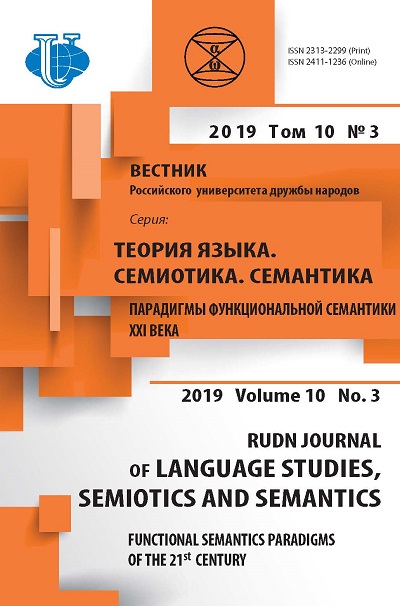Hermeneutic Aspects of Bilingualism: the Role of Interlingual Interference
- Authors: Sverdlova N.A1
-
Affiliations:
- Irkutsk Scientific Center of Siberian Department of the Russian Academy of Sciences
- Issue: Vol 10, No 3 (2019): Functional Semantics Paradigms of the 21st century
- Pages: 602-609
- Section: METHODOLOGY AND METHODS OF FUNCTIONAL SEMANTICS AND LINGUOSEMIOTICS
- URL: https://journals.rudn.ru/semiotics-semantics/article/view/22118
- DOI: https://doi.org/10.22363/2313-2299-2019-10-3-602-609
- ID: 22118
Cite item
Full Text
Abstract
The article is devoted to the problem of studying bilingualism. The object of study is the mechanism of acquiring a non-native language, considered in the context of the hermeneutic approach. For a deeper analysis of the process of acquiring a non-native language, the role of mental and metapsychic categories on the way to bilingual understanding of new knowledge about the world is considered. The activity of a person in the conditions of personal choice is a complex one, where the central place is given to consciousness. Understanding, as a function of consciousness, becomes a key issue in the interpretation of the reality where the bilingual is. The interpretation of all components of the “new” (other) culture and the world goes through language. The native language of the bilingual is associated through a particular set of “presetting” and “pre-understanding”. Gaining new experience in the conditions of conscious choice leads to the emergence of a double format of perception of the world, which does not contradict human nature, is a condition of completeness of the world view. The tasks of the researcher included the representation of linguistic personality in terms and concepts of hermeneutics; the definition of the basic mental processes that are characteristic of the formation of bilingual linguistic personality; the study of interference as a natural process and the result of the interpretation of the phenomena of reality. The article attempts to explain the role of consciousness and understanding in bilingual speech activity and to define the essence of interlanguage interference in the light of the applied approach. In interaction of conceptual and linguistic spheres of the system, appears for the interference systems. Due to irreversible changes in the structure of linguistic consciousness, interlingual interference becomes a natural process that can disrupt decoding under certain communication conditions.
About the authors
Nataliya A Sverdlova
Irkutsk Scientific Center of Siberian Department of the Russian Academy of Sciences
Author for correspondence.
Email: nsverdlova@yandex.ru
PhD in Philology, Associate professor, Head of the Department of Scientific, Education Activity and Expertise, Head of the of the Department of Irkutsk Scientific Center of the Siberian Branch of the Russian Academy of Sciences; Associate professor of the Department of Foreign languages and Philosophy
Irkutsk, RussiaReferences
- Lebedev, S.A. (2004). Philosophy of science: Dictionary of basic terms. Мoscow: Academichesky Proekt. URL: http://philosophy_of_science.academic.ru/51/ (accessed: 10.03.19). (In Russ.).
- Gadamer, H.-G. (1988). Truth and method: The basics of philosophy hermeneutics. Мoscow: Progres. (In Russ.).
- Blinnikov, L.V. (1994). Brief dictionary of philosophers. Мoscow: Nauka publ. (In Russ.).
- Heidegger, М. (1997). Being and time. Мoscow: Ad Marginem. (In Russ.).
- Wittgenstein, L. (1994). Logical-philosophical treatise In Philosophical works. Part I. Мoscow: Gnozis. (In Russ.).
- Balyasnikova, O.V., Cherkasova, G.A., Stepanova, A.A. & Ufimtseva, N.V. (2017). Ethnopsycholin-guistic aspect of regional language consciousness. RUDN Journal of Language Studies, Semiotics and Semantics, 8(4), 1161—1170. doi: 10.22363/2313-2299-2017-8-4-1161-1170. (In Russ.).
- Sverdlova, N.А. (2018). Lingvopsychological features of formation of linguistic bilingual identity. Vestnik of MSLU. Humanities, 6 (797), 196—203. URL: http://libranet.linguanet.ru/ prk/Vest/6_797.pdf (accessed: 02.03.19). (In Russ.).
- Ufimtseva, N.V. (2015). The dichotomy of the value/importance of the study of language consciousness. In: Life of language in culture and society—5: materials of the international scientific conference. E.F. Tarasov (Ed.). Moscow: The Chancellor Publishing House. pp. 29—30. (in Russ).
- Rudnev, V.P. (2003) Encyclopedic dictionary of culture of the XX century: Key concepts and texts. Мoscow: Agraf, 2003. pp. 50—51. (in Russ).
- Kytina, V.V. (2017). Role of extralinguistic factors in the formation of language personality of bilingual child, RUDN Journal of Language Studies, Semiotics and Semantics, 8(4), 949—956. doi: 10.22363/2313-2299-2017-8-4-949-956. (in Russ).
Supplementary files












